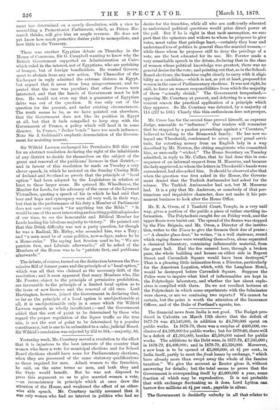Yesterday week, Mr. Courtney moved a resolution to the effect
that it is injurious to the best interests of the country that women who have a vote for municipal elections and for School Board elections should have none for Parliamentary elections, when they are possessed of the same statutory qualifications as those required for men. Admit women to the franchise, he said, on the same terms as men, and both they and the State would benefit. But he was not disposed to press this argument so as to give married women a vote, —an inconsistency in principle which at once drew the attention of the House, and weakened the effect of an other- wise able speech. Mr. Courtney tacitly assumed that it was only women who had no interest in politics who had no
desire for the franchise, while all who are sufficiently educated to understand political questions would prize direct power at the poll. But if he is right in that tacit assumption, we sus- pect that the spinsters and widows to whom he proposes to give votes, must value that privilege least, —certainly they hear and understand less of politics in general than the married women,— while those whom he proposes still to deny the privilege of a vote, are the best educated for its use. Mr. Forster made a very remarkable speech in the debate, declaring that in the class of women whose political knowledge was greatest, there was no general desire for the vote; and pointing out that, as in the School- Board elections, the franchise ought clearly to carry with it eligi- bility as a candidate,—which is not, as yet at least, proposed for women in the case of Parliamentary elections. It was not right, he said, to force on women responsibilities from which the majority of them "actually shrink." The Government temporized,— opposing Mr. Courtney at present, and deferring to a more con- venient season the practical application of a principle which they approve. So Mr. Courtney was defeated, by a majority of 114 (217 to 103.) Clearly this thin enthusiasm does not prosper.


































 Previous page
Previous page